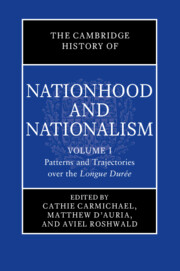Refine search
Actions for selected content:
96 results
Chapter 3 - Viva l’Italia!
-
- Book:
- Emigrant Soldiers
- Published online:
- 05 June 2025
- Print publication:
- 26 June 2025, pp 50-72
-
- Chapter
- Export citation
9 - The People’s Army of Vietnam
- from Part I - Battlefields
-
-
- Book:
- The Cambridge History of the Vietnam War
- Published online:
- 02 January 2025
- Print publication:
- 28 November 2024, pp 189-217
-
- Chapter
- Export citation
20 - Prowar Sentiment in the United States
- from Part II - Homefronts
-
-
- Book:
- The Cambridge History of the Vietnam War
- Published online:
- 02 January 2025
- Print publication:
- 28 November 2024, pp 428-449
-
- Chapter
- Export citation
8 - Conclusions
-
- Book:
- Nations before the Nation-State
- Published online:
- 14 November 2024
- Print publication:
- 21 November 2024, pp 181-198
-
- Chapter
- Export citation
8 - Joined and Disjoint in War
- from Part III - Living in Germany: 1870–1930
-
- Book:
- Germany through Jewish Eyes
- Published online:
- 14 November 2024
- Print publication:
- 21 November 2024, pp 131-146
-
- Chapter
- Export citation
3 - A Tale of Two Fatherlands
-
- Book:
- Nations before the Nation-State
- Published online:
- 14 November 2024
- Print publication:
- 21 November 2024, pp 47-75
-
- Chapter
- Export citation
Introduction
-
- Book:
- Streetscapes of War and Revolution
- Published online:
- 30 May 2024
- Print publication:
- 06 June 2024, pp 1-21
-
- Chapter
-
- You have access
- Open access
- HTML
- Export citation
2 - Black–Yellow Surfaces
-
- Book:
- Streetscapes of War and Revolution
- Published online:
- 30 May 2024
- Print publication:
- 06 June 2024, pp 69-114
-
- Chapter
-
- You have access
- Open access
- HTML
- Export citation
Conclusion
-
- Book:
- Streetscapes of War and Revolution
- Published online:
- 30 May 2024
- Print publication:
- 06 June 2024, pp 292-297
-
- Chapter
-
- You have access
- Open access
- HTML
- Export citation
4 - Imagining Home
- from Part II - Social Groups
-
- Book:
- Making Sense of the Great War
- Published online:
- 11 April 2024
- Print publication:
- 18 April 2024, pp 160-194
-
- Chapter
- Export citation
9 - On the Primacy of Peoplehood
-
-
- Book:
- The Cambridge Companion to Rousseau's <i>Social Contract</i>
- Published online:
- 28 March 2024
- Print publication:
- 22 February 2024, pp 179-206
-
- Chapter
- Export citation
Chapter 1 - ‘Unser Shakespeare’? The Tercentenary and Germany
-
- Book:
- Shakespeare's Tercentenary
- Published online:
- 13 January 2024
- Print publication:
- 21 December 2023, pp 22-62
-
- Chapter
- Export citation
Chapter 3 - Sacrifice
- from Part I - Developing Ideals
-
- Book:
- Imagining War and Peace in Eighteenth-Century Britain, 1690–1820
- Published online:
- 10 January 2024
- Print publication:
- 23 November 2023, pp 75-99
-
- Chapter
- Export citation
18 - Patriotism in the Second World War: Comparative Perspectives on Countries under Axis Occupation
- from Part ii - Paradigm Shifts and Turning Points in the Era of Globalization, 1500 to the Present
-
-
- Book:
- The Cambridge History of Nationhood and Nationalism
- Published online:
- 27 October 2023
- Print publication:
- 09 November 2023, pp 399-420
-
- Chapter
- Export citation
18 - Domestic Criticisms of Foreign Judges
- from Judicial Identity and the Judicial Role
-
-
- Book:
- The Cambridge Handbook of Foreign Judges on Domestic Courts
- Published online:
- 26 October 2023
- Print publication:
- 09 November 2023, pp 284-299
-
- Chapter
- Export citation

The Cambridge History of Nationhood and Nationalism
-
- Published online:
- 27 October 2023
- Print publication:
- 09 November 2023
Chapter 3 - ‘Patriotic’ Shakespeare and Dialectics of Conflict during the French Revolutionary-Napoleonic Wars (1792–1815)
- from Part I
-
- Book:
- Wartime Shakespeare
- Published online:
- 12 October 2023
- Print publication:
- 26 October 2023, pp 105-145
-
- Chapter
- Export citation
4 - The American Fascists
- from Part II - Homegrown Nazis
-
-
- Book:
- Fascism in America
- Published online:
- 14 September 2023
- Print publication:
- 14 September 2023, pp 141-169
-
- Chapter
- Export citation
Chapter 12 - The Conservative and Patriotic 1890s
-
-
- Book:
- Nineteenth-Century Literature in Transition: The 1890s
- Published online:
- 17 August 2023
- Print publication:
- 07 September 2023, pp 246-263
-
- Chapter
- Export citation
Chapter 2 - The Seven Years’ War (1756–1763) and Garrick’s Shakespearean Nationalism
-
-
- Book:
- Shakespeare at War
- Published online:
- 17 August 2023
- Print publication:
- 17 August 2023, pp 17-26
-
- Chapter
- Export citation
